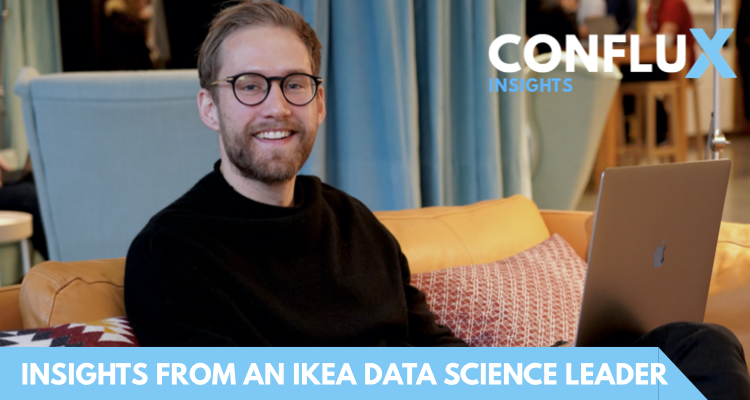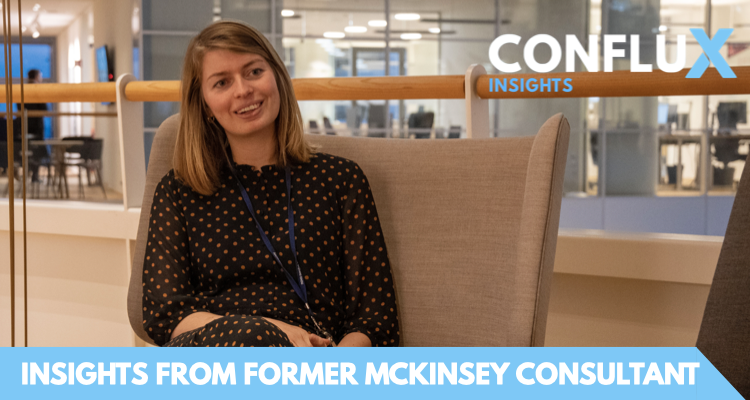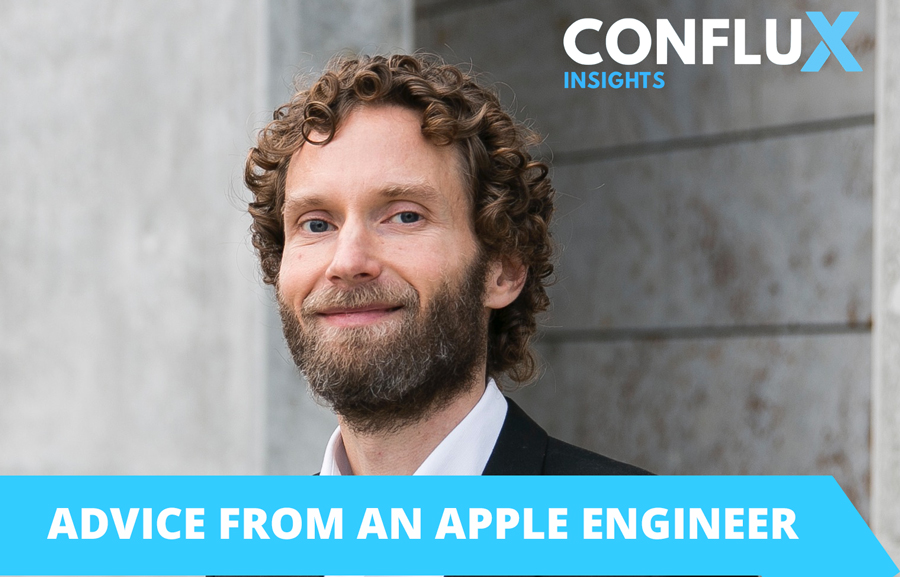
Emil S. Jørgensen is Director of Product Analytics at IKEA, leading the development of data-driven digital products in the Customer Experience Domain.

Emil S. Jørgensen is Director of Product Analytics at IKEA, leading the development of data-driven digital products in the Customer Experience Domain.

Emil S. Jørgensen is Director of Product Analytics at IKEA, leading the development of data-driven digital products in the Customer Experience Domain.


Kristina Linde Hansen’s career path probably stands out from that of the engineer stereotype you have in your head. She has worked at McKinsey & Company for 3½ years, lived in 4 countries, worked in journalism on several occasions and today she is a strategy manager at the Novo Nordisk Foundation, which grants +5 billion DKK a year to benefit research and the Danish society.
I reached out to Kristina to discuss this interesting career path with her. Specifically, I wanted to discuss:
Below, we will find the answers to these questions by diving into Kristina’s interesting story.
Career advice is always subjective and these choices are, at their core, personal preferences. However, there is still tremendous value to be found in mimicking and learning from interesting people with interesting careers – especially those whose story you can see yourself in.
Conflux Insights is a new series of articles where we learn key insights and findings from interesting Conflux mentors from the Danish STEM industries and share them with you.
Kristina has a natural curiosity to her, which shines through all she does.
In high school, she found all of her subjects (except for gymnastics) to be interesting – especially mathematics. Thus it was a rather obvious choice to continue down that path at DTU to study Mathematics and Technology – “and I thought it made more sense to study mathematics and then read history and literature in my spare time than to do the opposite” she says.
It was a great fit for her to study applied mathematics – especially when the ‘applied’ part was loud and clear:
“During my Bachelor, it became clear to me that I thrived the most when the problems at hand were real problems. It had to have some kind of real-world application. And this insight turned especially clear during my bachelor thesis. Yes, the problem I worked on was interesting from a mathematical point of view, but I missed the real-world applications of it. And it taught me how important the real-world-aspect of a problem is to me.”
Because of this, Kristina chose to study MSc Management Engineering at DTU. The idea was to get closer to “the real world out there” and combine it with math-topics like operational analysis and logic.
“In the beginning, I thought: ‘Now I need to be broad and try all sides of management!’. And it was in many ways an exciting new world to me. But at the end of my Masters, I realized the importance of actually becoming good at something. It’s so important to also go deep.” This thought pointed her last semesters back towards the mathematical domains.
It’s striking how close these considerations are to the ones that Sune Grønskov from Ørsted and Daniel Eggert from Apple shared when I discussed whether one should be a generalist or a specialist. And all stories point towards the same realization: a T-shaped profile, i.e. one where you are specialized in a narrow domain but also know a bit in several other domains is often the right one to strive for. And to me, it also seems like it is the profile most people naturally tend towards in the long run.
Apart from the studies, Kristina’s time at DTU must have been quite busy. She was an active member of the Student Council, started a university newspaper for her study line, and went on exchange and summer schools on several occasions. Besides this, she tried forces in journalism and played a part in coordinating the EuroScience Open Forum in 2014.
At first glance, these gigs may seem to go in all different directions. But this strategy actually makes a lot of sense: If you make lots of small bets within topics that you find interesting that will later on create more and better opportunities around you:
“Throughout my studies, I felt quite fortunate to have so many different opportunities land at my feet. But when I look back now, I believe much of the credit lies in me always being curious and pro-active. By reaching out and seeking chances when they showed up, I was effectively ‘boosting’ my luck. Great opportunities arise from constantly keeping one’s finger on the pulse of what’s going on around you” Kristina explains.
It’s an interesting framing to boost one’s luck by being constantly alert. And this framing also nicely ties Kristina’s different gigs together; by doing many, but small, “bets” in all sorts of domains, she 1) steadily develops her own profile and learns what she enjoys working with. And 2) she puts herself out there and exposes herself to different ways of thinking. Something that turned out to be of great use later on in her career at McKinsey.
Whether this strategy is a consequence of Kristina’s natural curiosity or something she explicitly strived for, is not that relevant. But it’s interesting in how many areas this pattern arises. Another example is when we discussed student jobs:
“I don’t think I stayed at a student job for much longer than about a semester at a time. Not because I didn’t like the jobs! But I often purposely went to work on time-bound project teams or internships and then afterwards, something new and exciting would always come up. Either an exchange semester or a new fun opportunity or job. And I think that’s a great and natural consequence of the university structure: It allows you to do so many smaller experiments here and there.”
Your time at university presents you with so many great opportunities for trying out all sorts of different things. It comes naturally for many to take leverage of this. Like second nature. But it is also something worth having in the back of your mind when deciding what to do besides your studies – at least it is to me.
But of course, this doesn’t mean that you have to ditch your student job every 6 months. That would be silly! It’s not the “new” in “new student job” that by default will be of most value to you. But what is important is to challenge yourself and learn and test out new things about yourself/your industry/your domain, which is especially do-able when you’re a student.
As Kristina puts it: “It’s not that you constantly have to jump to something new to avoid stagnation. Instead, the important thing is to ask yourself: ‘Am I being challenged and still learning a lot where I am? Or am I getting a bit too comfortable here?’ If so, I believe you should seek something more ambitious – either in a new role or a new company.”
The curiosity and interest in different ways of working also play nicely together with Kristina’s time at the consultancy firm McKinsey, which she joined after her graduation at DTU:
“My interest slowly developed into a more general interest for pattern recognition and logical program thinking: ‘How about we try to think about this problem in a new way? How about we get inspired by how they do it in a completely different domain?’ – I find these kinds of questions really intriguing and fun to work with.”
These reflections make a lot of sense, and they match well with her story. But this kind of creative thinking is present in several other industries as well – so why did she join McKinsey instead?
“When working in consulting you get exposed to a wide range of different tasks across many different industries. And in that regard, it presents a steep learning curve over and over – which was really important for me, and something I believe people should strive for in their first job: the more growth opportunities the better. But on the other hand, choosing to work in consulting is a bit like not choosing anything. You effectively postpone the decision and keep all doors open so to speak – which can both be a good and bad thing. For me it was quite nice, I think.”
Kristina worked at McKinsey in Copenhagen for 3 years, whereafter she joined their office in Tokyo for 6 months to “mix things up and experience living in a completely different culture“. During her time in Copenhagen, she also played a role in several exciting projects abroad in Sweden, Great Britain, and The Netherlands to name a few.
I was curious as to what degree her engineering background was in use when working for various clients. How was it to work in consultancy with an engineering background?
“I would say there is a tendency for consultancy firms to hire more engineers these days. McKinsey works for a vast client-base where several of them are centered around science and technology. So it makes sense to hire people who know this space. So I think we were ~25-30% with an engineering background. However, you should not expect to work with complex machine learning models or apply the theory behind Fourier Transformations when joining McKinsey. Instead, it’s all about figuring out how you can use all of these exciting tools and how they fit into a business context. For example, I often ended up working with digital trends and how analytics and AI could be used to solve problems in non-data-driven industries. So my background was definitely beneficial when working with these kinds of clients, but not in the same way it would have been if I were to work in a more traditional engineering role”.
Finally, we’ll wrap up what insights Kristina has given us and what we can learn from her story:
If you have any comments or questions about the article or Conflux Insights in general, please reach out at jakobo@conflux.dk.
Thanks to Kristina Linde Hansen for sharing her experiences and career history with us.
This interview was performed and written by Jakob from Conflux.

Emil S. Jørgensen is Director of Product Analytics at IKEA, leading the development of data-driven digital products in the Customer Experience Domain.

Sune Grønskov has worked in every part of the value chain within power grids and offshore at Ørsted. He has been an Operations Specialist, Project Manager (PM), Team Leader, Senior Specialist, and is currently working as a Manager

Daniel Eggert has become an expert within software development since he graduated from Technical University of Denmark (DTU) in 2003.